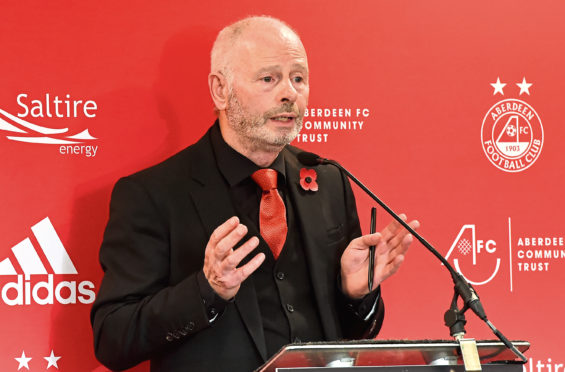The test to assess the impact made by any football club chairman should be a simple one – did they leave the club in a better position than they inherited?
Stewart Milne will step down as Aberdeen chairman with the Dons in a far stronger position than he encountered in 1998 when the club was saddled with debt.
Rangers, Hearts, Motherwell and Dundee were among the clubs to endure severe financial woes as they paid the price for trying to speculate to accumulate during Milne’s tenure.
The Aberdeen chairman’s more prudent approach may not have always appeased the support but he deserves a huge amount of credit for transforming the club’s bank balance and helping clear the debt.
Investment from Willie and Elaine Donald in 2014 played a pivotal role in helping clear the club’s net debt of £14.49m and gave the Dons the platform to push forward with their plans for a new training complex and stadium at Kingsford.
Clearing the club’s debt was a major achievement for Milne and the opening of the club’s new training complex Cormack Park at the end of October represented another sign of tangible progress.
The absence of a training ground of their own has been a major bugbear of Aberdeen managers throughout the years so seeing Sir Alex Ferguson back in the Granite City to open the new complex must have given Milne a considerable sense of pride.
There have, of course, been highs and lows during Milne’s two decades in charge of the club.
Some of his managerial appointments did not work out, such as Steve Paterson and Mark McGhee, while others enjoyed more fruitful spells in the dugout.
Derek McInnes has been his most successful Dons manager, ending the club’s 19-year wait for silverware with League Cup success in 2014, while making European football and trips to Hampden a more regular occurrence.
Jimmy Calderwood enjoyed many positive moments during his time in charge, while Craig Brown helped lay the foundations for the McInnes era by clearing the decks after McGhee’s disastrous stint in charge.
Nonetheless, the Aberdeen supporters are likely to be excited about the prospect of change in the boardroom.
A new regime can bring fresh thinking and greater investment in the playing staff.
Milne’s successor Dave Cormack, a lifelong Aberdeen fan, is a man with considerable wealth and he has already proved that by ploughing plenty of his own money into helping fund the training complex.
Having previously worked as the club’s interim chief executive around the turn of the century and more recently as vice-chairman, Cormack knows the job he is taking over.
It will be intriguing to hear Cormack’s vision for the club and how that may differ to the path it has been on in recent years. A fascinating time awaits but Milne can vacate his role with his head held high.
